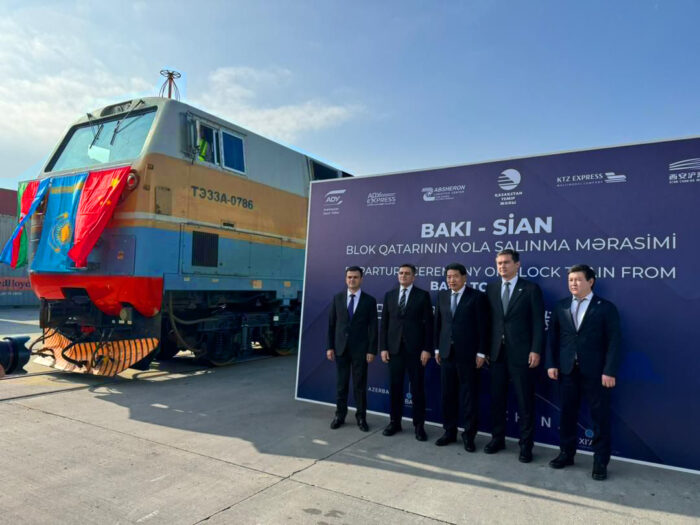ASTANA – The first container train on the Trans-Caspian International Transport Route’s (TITR) return trip from Baku (Azerbaijan) to Xian (China) via Kazakhstan was officially launched on Nov. 24. The train, carrying 62 containers of petroleum coke, will travel along the TITR as part of the reverse loading and arrive in just 12 days.

Photo credit: Press service of NC Kazakhstan Temir Zholy
The service is arranged by KTZ Express, a subsidiary of Kazakhstan Temir Zholy (KTZ) national railway company, with Xian Free Trade Port (PRC), Absheron Logistics and ADY Express (Azerbaijan). This route creates new prospects for efficient and rapid cargo movement between the West and Europe, reported KTZ press service.
Today, TITR, also known as the Middle Corridor, reduces transportation times and ensures the reliability and safety of cargo transportation. One of the advantages is the delivery time – from 12 to 15 days in transit through the territory of Kazakhstan from China to countries such as Azerbaijan, Georgia, Türkiye and others. Previously, similar cargo was transported by trucks through the port of Trabzon, and subsequent sea transit to China took more than 40 days.
The Middle Corridor connects Southeast Asia and China with Europe. It traverses Kazakhstan, the Caspian Sea, Azerbaijan, Georgia, and Türkiye before reaching the European Union countries.
Last week, KTZ, Hungary’s L.A.C. Holding, and China’s Xian Free Trade Port Construction and Operation agreed to establish a joint intermodal cargo terminal in Budapest. With a capacity of 230,000 twenty-foot equivalent units (TEUs) annually, the terminal will increase the number of container trains on the China-Europe-China route, including transit via the Middle Corridor.
The volume of cargo transportation along the route increased by 63% to 2.5 million tons in January-July. According to Satzhan Ablaliyev, Kazakh Deputy Transport Minister, this figure is expected to reach 4.2 million tons in 2024. The countries plan to increase the route’s capacity to ten million tons annually.
